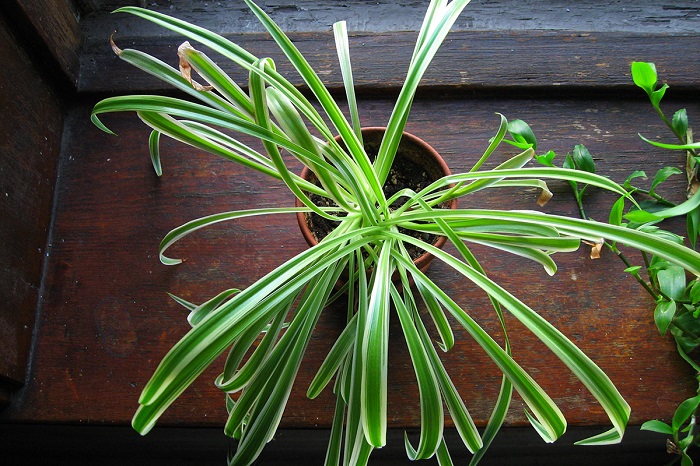EarthTalk®
From the Editors of E – The Environmental Magazine

Some plants are better than others when it comes to filtering pollutants out of your indoor air, so choose carefully. Credit: David B. Gleason, FlickrCC.
Dear EarthTalk: Do houseplants really improve indoor air quality? Which ones are the most effective as such — Kay Hamm, Los Angeles, CA
In recent years, more and more people have developed an interest in keeping houseplants. There are many potential reasons why there has been such a resurgence in indoor gardening.
Many people took up tending to houseplants during the pandemic as a quarantine hobby. As the years have progressed, people’s interest in keeping houseplants has continued to thrive and it’s easy to understand why.
They liven up any living space, and provide people with something to care for—both which provide many mental health benefits. However, there has been speculation as to whether or not keeping houseplants provides environmental and health benefits through purifying the air in our homes.
The short answer is that houseplants do have the potential to purify the air in our homes.
When plants perform photosynthesis, they take carbon dioxide out of the air and emit oxygen as a byproduct. Since plants output oxygen into the surroundings, by scientific definition they have the potential to increase the oxygen concentration in your living space.
However, the degree to which they can detoxify the air and measurably make a difference to the air quality in a person’s living space is another matter.
“There is currently no evidence…that a reasonable number of houseplants remove significant quantities of pollutants in homes and offices,” reports the U.S. Environmental Protection Agency. Indeed, in order to make a considerable difference in the air quality of your home, you’d have to keep a large number of houseplants under specific climatic conditions, requiring a large amount of effort, time and money that isn’t realistic for most of us.
Having houseplants can even worsen indoor air quality if you are overwatering them, as overly damp soil may promote the growth of microorganisms which can affect allergic individuals.
However, if you are interested in keeping houseplants that have the potential to clean the air in your home, there are a variety to choose from.
There are two major air pollutants found in homes: particulates—dust, mold, etc.—and volatile organic compounds (VOC)—gases that are released from materials such as fabric, paint and cleaning products.
Spider plants, philodendrons, ZZ plants, dumb canes, pygmy date palms and ivies are among the plants suited to indoor living that are especially good at filtering out particulates.
Other plants especially good at removing volatile organic compounds (VOCs) out of your indoor air include pathos, bamboo, Areca palms, rubber plants and peace lilies.
You can usually find a wide assortment of indoor plants — and get more advice — at a local nursery or garden center.
Of course, there are also many other ways to improve the air quality of your home.
Keeping a clean home reduces the amount of particulate matter in the air. Investing in air purifiers and home air filters can help reduce both the concentration of VOCs and particulate matter that could be impairing your indoor air quality.
Simple tasks like opening your windows and airing out your home in the warmer months increases air circulation and benefits your home’s indoor environment.
CONTACTS:
Houseplant care tips for beginners
https://www.bhg.com/gardening/houseplants/care/houseplant-care-guide/;
EPA’s Improving Indoor Air Quality,
https://www.epa.gov/indoor-air-quality-iaq/improving-indoor-air-quality
EarthTalk® is produced by Roddy Scheer & Doug Moss for the 501(c)3 nonprofit EarthTalk.
See more at https://emagazine.com
To donate, visit https//earthtalk.org
Send questions to: question@earthtalk.org
